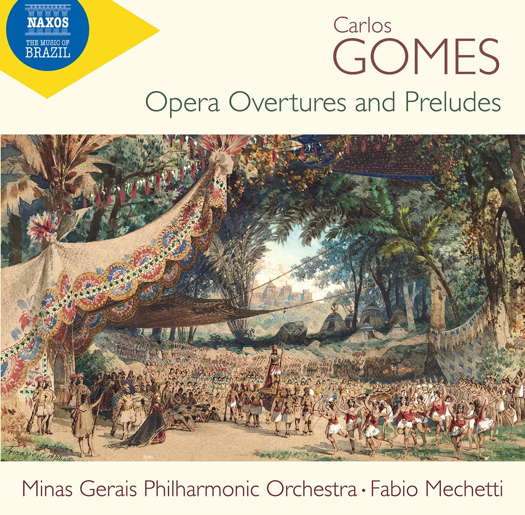- Paul Dean
- Bent Lorentzen
- April Fools
- Barry Tuckwell
- Le trouvère
- Debussy
- Moscow Conservatoire
- Fitzwilliam String Quartet
 CENTRAL ENGLAND: Mike Wheeler's concert reviews from Nottingham and Derbyshire feature high profile artists on the UK circuit - often quite early on their tours.
CENTRAL ENGLAND: Mike Wheeler's concert reviews from Nottingham and Derbyshire feature high profile artists on the UK circuit - often quite early on their tours.
 DISCUSSION: Composers Daniel Schorno and John Dante Prevedini discuss creativity, innovation and re-invention with Maria Nockin, Mary Mogil, Giuseppe Pennisi and Roderic Dunnett.
DISCUSSION: Composers Daniel Schorno and John Dante Prevedini discuss creativity, innovation and re-invention with Maria Nockin, Mary Mogil, Giuseppe Pennisi and Roderic Dunnett.

Unjustifiably Neglected
GERALD FENECH is impressed with orchestral music by Carlos Gomes
'I encourage you to invest in this beautiful album which will definitely sweep you off your feet.'
Born on 11 July 1836, Carlos Gomes was a Brazilian composer of mixed African, Portuguese and Amerindian blood. Gomes was the first Latin American and non-European composer to make it big. After making his name in Brazil with a couple of Portuguese-language, Italian-style operas, Emperor Dom Pedro II gave Gomes a scholarship to study in Milan.
Gomes' first Italian work was Il Guarany (1870), an opera-ballo - the Italian version of French grand opera, with exotic setting, historical subject, choruses and dancing. It was an enormous hit at La Scala and throughout Europe. Indeed, it was performed almost everywhere except France, Germany and Austria.
Listen — Carlos Gomes: Overture (Il Guarany)
(8.574409 track 1, 0:01-0:47) ℗ 2023 Naxos Rights (Europe) Ltd :
Verdi was taken in by this work and remarked: 'This young man begins where I finish; this opera is true musical genius.' Even Liszt praised it, saying: 'It displays dense technical maturity full of harmonic and orchestral invention.' The Milan premiere came three weeks after the Brazilians defeated Solano Lopez in Paraguay, and Il Guarany recalled Verdi's popular mid-century operas stemming from the Italian risorgimento, which were loaded with ideas of unification and moments of patriotic ardour. The opera was considered a trademark of Brazilianness. All this raised the stock of the composer no end, and he was the first Brazilian to achieve the status of an international composer, elevating his country to the status of a civilised nation.
More operas followed: Fosca (1873), which audiences found too gloomy and Wagnerian, Salvator Rosa (1874), a successful historical work about the Neapolitan revolution and Maria Tudor (1879), with a libretto by Arrigo Boito.
Listen — Carlos Gomes: Prelude (Maria Tudor, Act I)
(8.574409 track 2, 0:01-0:51) ℗ 2023 Naxos Rights (Europe) Ltd :
In Brazil Lo schiavo (1889), calling for the abolition of slavery, is Gomes' masterpiece. The failure of Condor (1891) forced the composer to leave Italy and return to Brazil, where he died on 16 September 1896, aged sixty. Being treated as a musical god in his native Brazil is not at all surprising, but taking Europe by surprise was more than one expected. Indeed, he helped pave the way for Italian verismo during the latter part of the nineteenth century.
This exciting issue of preludes and overtures from his operas - he wrote eight in all - charts a course from early experimentation with orchestral sonority to a new conception of atmosphere and tension in his historically based dramas. In 'Alvorada' (Dawn) from Lo Schiavo, his descriptive writing comes close to the status of a symphonic poem.
Listen — Carlos Gomes: Alvorada (Lo schiavo, Act IV Prelude)
(8.574409 track 10, 1:49-2:47) ℗ 2023 Naxos Rights (Europe) Ltd :
The music from his greatest artistic triumph, Il Guarany, weaves themes into an organic whole, and his final opera, Condor, is reminiscent of French orchestral music in its employment of whole-tone scales.
Listen — Carlos Gomes: Prelude (Condor, Act I)
(8.574409 track 3, 3:44-4:32) ℗ 2023 Naxos Rights (Europe) Ltd :
Gomes is an unjustifiably neglected composer whose music is overflowing with memorable melodies and audacious harmonies. And what about the dramatic content? I dare say, if you allow me, it is as vibrant as Verdi's. I encourage you to invest in this beautiful album which will definitely sweep you off your feet. Sound and annotations are first-rate.
Copyright © 14 March 2023
Gerald Fenech,
Gzira, Malta



